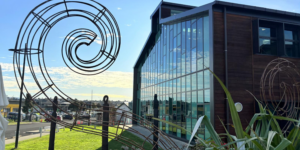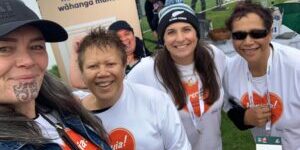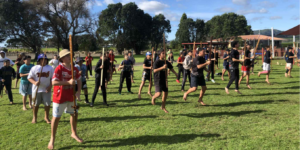WBOP PHO’s CPCT story featured in GPNZ national report on extended primary care teams
A recent report from general practice New Zealand (GPNZ) shows how extended primary care teams are improving access to care across Aotearoa. The document gathers real-life stories and highlights the success of the Comprehensive Primary and Community Teams (CPCT) initiative, which has helped general practices bring in new roles such as physiotherapists, clinical pharmacists and paramedics.
One of the featured stories comes from Western Bay of Plenty Primary Health Organisation (WBOP PHO). Physiotherapist Harriet Ferguson (Ngāti Porou) joined the team through CPCT funding in October 2024, after years working in hospitals in Australia, the UK, and New Zealand. She now works across three sites in Tauranga: Ngāti Kahu Hauora and Gate Pa Medical Centre (both low-cost access practices), and Rangiora Health Hub, an initiative led by Ngāti Ranginui.

“I’ve always worked in hospitals. In primary care you have a whole different sense of community, continuity, and often the chance to see people before their problems escalate,” says Harriet. A case that stands out for her was a home visit to an elderly man recently discharged from hospital. He had experienced several falls, and his wife was at risk of injury from helping him at home.
“I could go in much faster than the usual hospital-based follow-up. We looked at what equipment would help, we talked about safe mobility, and I gave his wife tips on manual handling so she wouldn’t continue to hurt herself.”
Sarah Stevenson, General Manager of Community Services at WBOP PHO and contract manager for CPCT, sees a clear link between Harriet’s work and the wider value of the programme.
“When patients can access early intervention, they’re less likely to have things get worse for them. We catch things early and manage them in the community, which, let’s face it, is where people want to be.”

In her first few months, Harriet has also worked closely with Health Improvement Practitioners (HIPs) and health coaches to help people get the right equipment quickly and safely.
“With me on the team,
it has been a lot easier than the route they would have otherwise gone down to access necessary and
simple things like a walking frame to keep someone safe from falls.”
“One lady with advanced osteoarthritis was using a child’s pram to
move around her home. When I got her a proper walking frame, she called it ‘the best Christmas present ever.”
Sarah says these small changes make a big difference. “The ‘other route’ Harriet politely describes involves multiple referrals, waiting a month or more, and having to tell your story again to someone new. Even with a Health Coach walking alongside a person, empowering them with health literacy and supporting them to make their own decisions, it all can feel too long, too hard.”
Harriet’s strong hospital connections have also created new ways to collaborate. She and the hospital team have reviewed waiting lists and identified patients who could be seen in the community instead. This means faster care for patients and less pressure on hospital services.
“Harriet has helped countless people find new mobility, avoid hospital admission and return to work faster. Her role is more than a nice convenience. It is a lifeline and a vision of how primary care can evolve to meet New Zealand’s health challenges head-on,” concludes Sarah.
Clear benefits amid funding uncertainty

The GPNZ report Extended Primary Care Teams – Current State, Future Opportunities, published last week, comes at a time when Primary Health Organisations (PHOs) and general practices around the country are waiting to hear whether funding for the Comprehensive Primary and Community Teams (CPCT) will continue.
CPCT is a national initiative that funds general practices to grow their teams with new roles such as pharmacists, paramedics and physiotherapists. It builds from the work pioneered by PHOs, along with research showing expanding the skill mix in general practice improves access and equity.
Budget 2022 committed $102 million over three years to support this initiative. The current funding ends on 30 June 2025. Te Whatu Ora | Health New Zealand has said it is exploring options to continue the programme, but no formal decision has been made yet.
“Bringing new roles into the practice team isn’t just about increasing capacity by doing more of the same things, it also expands the capability of that team, giving whānau access to services that weren’t previously available,” said Mr Swanson-Dobbs, CEO at WellSouth Primary Health Network and member of the GPNZ Executive Committee, in the media release. “In pulling this report together GPNZ has heard countless stories of success up and down the country, with clear association with better patient outcomes.”
The 36-page report combines data, insights, seven case studies and real-life examples. It indicates extended primary care teams have helped reduce hospital admissions and ED visits, shortened wait times for appointments, and made care more personalised and connected.





